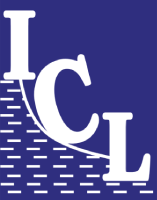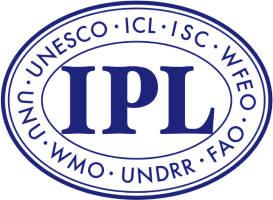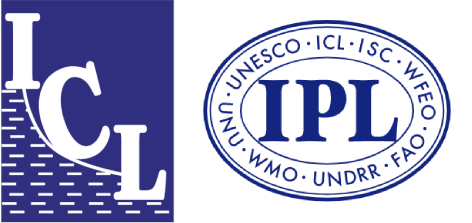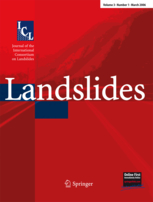Statutes
I: Denomination
1. ICL: The International Consortium on Landslides, hereinafter named “ICL” is an international non-governmental and non-profit making scientific organization.
II: Objectives
2. The principal objectives are to:
- promote landslide research for the benefit of society and the environment, and capacity building, including education, notably in developing countries;
- integrate geosciences and technology within the appropriate cultural and social contexts in order to evaluate landslide risk in urban, rural and developing areas including cultural and natural heritage sites, as well as to contribute to the protection of the natural environment and sites of high societal value;
- combine and coordinate international expertise in landslide risk assessment and mitigation studies, thereby resulting in an effective international organization which will act as a partner in various international and national projects; and
- promote a global, multidisciplinary Programme on landslides, the International Programme on Landslides (See Chapter XVI).
III: Background, Domicile and Achievements
3. The International Consortium on Landslides (ICL) was created in 2002 as a result of several international initiatives by specialists in the field of landslides:
- the international newsletter “Landslide News”, published since 1986 by the Japan Landslide Society in cooperation with UNESCO and other international organizations and experts;
- the 1999 Memorandum of Understanding between UNESCO and the Disaster Prevention Research Institute, Kyoto University, Japan (DPRI/KU) concerning cooperation in research for landslide risk mitigation and protection of the cultural and natural heritage as a key contribution to environmental protection and sustainable development in the first quarter of the twenty-first century; and
- the 2001 Tokyo Declaration “Geoscientists tame landslides” in the UNESCO/IGCP Symposium on Landslide Risk Mitigation and Protection of Cultural and Natural Heritage.
- Kyoto University and UNESCO jointly organized an international symposium on Landslides and Cultural Heritages in Kyoto in 2002. The round table discussion during the symposium decided to launch the ICL and elected Professor Sassa as the first president. ICL started to organize Board of Representatives (BoR) and Steering Committee Meeting every year since 2003. At the BoR meetings, Varnes Medals and Best Paper Awards are given to laureates.
4. The domicile of ICL is Kyoto, Japan, where the Secretariat is located and ICL is legally registered as a non-profit organization of the Kyoto Prefectural Government according to the Japanese law. The official languages of the Consortium are English and Japanese.
- ICL was registered as a legal body (No.1300-05-005237) under the Japanese law in the Kyoto Prefectural Government, Japan in August 2002.
- ICL was approved as a scientific research organization (No. 94307) which can apply and receive the scientific grant of the Ministry of Education, Culture, Sports, Science and Technology (MEXT), Japan in March 2007 and registered in the cross-ministerial research and development management system (e-Rad) of all ministries of Japan (No.5010000002) in May 2008.
- ICL was approved to be a NGO having operational relations with UNESCO in April 2007. It was reclassified as NGO with the consultative partnership with UNESCO in March 2012.
5. Major achievements and development of ICL activities until 2023 since its establishment in 2002 are summarized as follows:
- ICL established the UNITWIN (University Twining and Networking) Cooperation Programme on Landslide risk mitigation for society and the environment with UNESCO and Kyoto University in March 2003. The UNITWIN Headquarters Building was constructed by ICL and Kyoto University in Kyoto University Uji Campus in September 2004. Thereafter, the programme was developed to Landslide and water–related disaster risk management for society and the environment in November 2010.
- ICL founded “Landslides”: Journal of the International Consortium on Landslides in 2004 as a core activity of IPL. It is published by Springer Verlag and was initially a quarterly journal. but became a bimonthly journal from Vol.10 in 2013. It has been an approved ISI journal since 2005,
- ICL founded the International Programme Landslides (IPL) by adopting the 2006 Tokyo Action Plan together with 7 global stakeholders. It exchanged MoU to promote IPL with the United Nations Educational, Scientific and Cultural Organization (UNESCO), the World Meteorological Organization (WMO), the Food and Agricultural Organization of the United Nations (FAO), the United Nations International Strategy for Disaster Reduction (UNISDR), the United Nations University (UNU), the International Council for Science (ICSU), the World Federation of Engineering Organizations (WFEO) in 2006.
- The IPL Global Promotion Committee (IPL-GPC) was established following the 2006 Tokyo Acton Plan to manage IPL activities including IPL projects, the World Landslide Forum (WLF) every three years, and the World Centres of Excellence on Landslide Risk Reduction (WCoEs) to be identified at WLF.
- The First World Landslide Forum (WLF1) was organized at the United Nations University, Tokyo, in November 2008, the Second World Landslide Forum (WLF2) at the Food and Agriculture Organization (FAO) of the United Nations, Rome, in October 2011, and the Third World Landslide Forum (WLF3) at National Convention Center of China, Beijing, in June 2014. WCoE (World Centre of Excellence) and IPL Award of Success were awarded to the laureate organizations / individuals.
- ICL held the ICL 10th anniversary meeting, Kyoto, Japan in January 2012 and adopted the ICL Strategic Plan 2012-2021.
- Thematic Networks and Regional Networks were established following ICL Strategic Plan 2012-2021.
- ICL adopted the 2014 Beijing Declaration “Landslide Risk Mitigation: Toward a Safer Geo-environment” at the WLF3 in Beijing.
- ICL proposed the “ISDR-ICL Sendai Partnerships 2015-2025 for global promotion of understanding and reducing landslide disaster risk” in the Third United Nations World Conference on Disaster Risk Reduction in Sendai, Japan, 2015. The partnerships proposal was agreed and signed by 17 organizations (ICL, five UN organizations of UNISDR (UNDRR), UNESCO, WMO, UNU, FAO, three Governments of Japan, Italy, Croatia, and 6 NGOs of ICSU (ISC), WFEO, IUGS, IUGG, Science Council of Japan, and Global Risk Forum).
- The Fourth World Landslide Forum was organized in May-June 2017 in Ljubljana, Slovenia. The Sendai Landslide Partnerships 2015-2025 was reviewed as the very successful framework and should not be terminated in 2025. The Ljubljana Declaration on Landslide Risk Reduction adopted in WL4 stated to prepare a new landslide framework to be continued after 2025. The tentative name was the Kyoto 2020 Commitment for the World Landslide Community.
- ICL proposed and established with supports from GPC/IPL “Kyoto 2020 Commitment for global promotion of understanding and reducing landslide disaster risk” (Kyoto Landslide Commitment 2020 or KLC2020) in 2020 by adopting the 2020 Kyoto Declaration “Launching of Kyoto Landslide Commitment 2020.”
- The KLC2020 Secretariat 2020 was established within the ICL Secretariat. GPC/IPL was renamed as the Global Promotion Committee of the International Programme on Landslides and Kyoto Landslide Commitment 2020 (GPC/IPL-KLC).
- ICL and GPC/IPL-KLC organized the Fifth World Landslide Forum in Kyoto, Japan, 2021. The high-level panel discussion in WLF5 concluded with the Adoption of the Launching Declaration of the ICL Open Access Book Series for KLC2020.
- The ICL Open Access Book Series “Progress in Landslide Research and Technology (P-LRT)” was launched in 2022. Volume 1, Issue 1, Issue 2, and Volume 2, Issue 1 and Issue 2 were edited and published in 2022-2023.
- ICL and GPC/IPL-KLC organized the Sixth World Landslide Forum in Florence, Italy, 2023. 1,202 people from 69 countries participated in WLF6.
IV: Members
6. Members are those organizations that support the objectives of ICL intellectually, practically and financially. Membership is for a minimum period of two years. Members will come from one of four categories:
- Intergovernmental organizations
- Non-governmental organizations
- Governmental organizations and public organizations
- Other organizations and entities.
V: Observers
7. Relevant UN entities and Governmental entities may wish to delegate Observers as Special Supporting Organizations to the Steering Committee and the Board of Representatives.
VI: Associates
8. Associates are organizations and individuals who support the objectives of ICL and meet the appropriate financial obligations but do not qualify for Member status.
VII: Supporters
9. Supporters are other organizations and individuals who support the objectives of ICL and provide funds for its activities.
VIII: Board of Representatives
10. Full power for the management of the affairs of the Consortium is vested in the Board of Representatives, which will meet at least annually. The quorum and internal regulations are defined by the bylaws.
11. The Board of Representatives shall be composed of representatives of the Member organizations. Each Member organization shall designate one Representative and one Alternative Representative.
12. In the absence of a Member’s Representative from any meeting of the Board of Representatives, the alternative representative may attend the meeting and exercise all the rights, powers and privileges of the absent Representative. Alternatively, the Representative may delegate his rights, powers and privileges to another Member of ICL for that particular meeting, or authorize him/her to act and vote on his behalf.
13. The Board of Representatives shall:
- determine general policy;
- initiate scientific programmes and decide on future priorities for the activities of ICL;
- approve or change, if necessary, the budget and accounts;
- examine and decide on each application for Member, Associate or Supporter status;
- elect the Officers of ICL in accordance with the Bylaws;
- terminate the status of any Member, Supporter of ICL which has failed to fulfill any of its obligations or when the association is no longer considered appropriate, in accordance with the Bylaws;
- change the Statutes and Bylaws;
- deal with other items which may be referred to it.
14. Voting will be decided on a simple majority. Each Member shall have one vote. Normally the President of ICL will not vote but in the event of a tie, the President may have the casting vote.
IX: Steering Committee of the Board
15. The Steering Committee of the Board shall consist of:
- the President, between 3 and 6 Vice Presidents (one Vice President as the Immediate Past President, 3 Vice Presidents for regions – Europe, Asia and America, one Vice President for the coming Forum and Vice President for other mission, if any), the Executive Director, and the Treasurer;
- Co-opted Members from the board recommended by the President to act as Assistants to the President during his term of office; and
- a limited number of “ex officio” observers from the United Nations Educational, Scientific, Cultural Organization (UNESCO), the World Meteorological Organization (WMO), the Food and Agriculture Organization of the United Nations (FAO), the United Nations International Strategy for Disaster Reduction (ISDR) Secretariat, the United Nation University (UNU), the International Council for Science (ICSU), the World Federation of Engineering Organizations (WFEO), the Ministry of Education, Culture, Sports, Science and Technology (MEXT) Japan, and other organizations as may be considered appropriate.
16. The Steering Committee, which duly reflects the international character of the consortium, reports to the Board of Representatives. It oversees the operations of ICL and recommends the direction and priorities of ICL to the Board of Representatives.
17. The Steering Committee shall meet as often as necessary and at least annually. Its duties are to:
- prepare the Agenda for the meetings of the Board of Representatives;
- present to each annual meeting of the Board of Representatives a report of the scientific and administrative activities of ICL since the previous ordinary meeting of the Board of Representatives;
- propose a draft budgetary outline for consideration by the meeting of the Board of Representatives and recommend the scale of annual membership fees to be paid by Members for the ensuing 3-year period; and
- review the scientific activities of ICL and make appropriate recommendations to the meeting of the Board of Representatives.
X: Secretariat
18. The Secretariat is responsible for the day-to-day operations of ICL. It consists of the Executive Director, the Treasurer, the Secretary-General and other secretarial members. The number of secretarial members may vary and will depend on the extent of the activities of ICL.
19. The Secretariat prepares for and reports to the meetings of the Steering Committee including:
- preparation of an annual work plan for the scientific and administrative activities of ICL;
- preparation of an annual budget and financial report for ICL;
- preparation of an annual report of the scientific and administrative activities of ICL; and
- dissemination of the results of landslide studies undertaken by or through ICL.
XI: WORLD LANDSLIDE FORUM (WLF)
20. In order to report and disseminate the activities and achievements of ICL, a World Landslide Forum (WLF) shall be convened once every three years by inviting ICL Members and ICL Supporting organizations, individual members within those organizations and all levels of co-operating organizations and individual researchers, engineers and administrators. The World Landslide Forum will receive reports on ICL’s activities and provide a forum for open discussion and new initiatives from all participants.
21. Symposia and Field Workshops shall be organised annually or as appropriate at/or between the World Landslide Forum, in order to present the scientific and technological progress achieved through ICL activities and to disseminate new proposals and new scientific initiatives.
XII: Officers
22. The Officers of ICL shall consist of the President and Vice Presidents, the Executive Director, the Treasurer and the Immediate Past President. They shall meet and communicate as often as is deemed necessary.
- The President of ICL shall preside at all meetings of the General Assembly, the Board of Representatives and the Steering Committee and shall perform such other duties and exercise such other powers as shall be assigned by the Board of Representatives.
- The Vice Presidents shall assist the President and in his/her absence preside at meetings and exercise the powers of the President in his place.
- The Executive Director, except as otherwise provided by the Board of Representatives, shall be the chief executive officer of the Consortium and execute contracts and agreements with external parties on behalf of ICL. The Executive Director, upon the approval of the Steering Committee, may appoint secretaries, working groups or committees to assist in carrying out the business of the Consortium.
- The Treasurer, in accordance with the financial regulations, approved by the Board of Representatives and set out in the Bylaws, shall collect and receive and have charge and custody of the funds and securities of the Consortium. The accounts of the Consortium shall be prepared at the end of each calendar year and submitted by the Treasurer to the Board of Representatives after having been audited by two authorized auditors appointed by the Board of Representatives.
- The Secretary-General shall execute all secretarial works for ICL, IPL Global Promotion Committee and IPL World Centre under the direction of the Executive Director and the Treasurer.
- Election and Terms of Office.
The President and Vice Presidents shall be elected by the Board of Representatives, in accordance with the Bylaws, and hold office for a term of three years, beginning from January 1st of the year following the ordinary meeting of the Board of Representatives at which he or she has been elected. The President, Vice President as the Immediate Past President, Vice President for the coming forum and Vice President for a mission may hold office for one term. Vice presidents for 3 regions may be re-elected but may not hold the same office for more than two consecutive terms.
The Executive Director and Treasurer shall each be recommended by the President and the Vice Presidents and approved by the Board of Representatives. They shall hold office for three calendar years beginning from January 1st of the year following the meeting of the Board of Representatives at which they have been approved. The Executive Director and the Treasurer may each be re-elected for no more than three consecutive terms.
The term of Secretary-General shall be recommended by the Executive Director and the Treasurer and approved by the Board of Representatives.
XIII: Finance
23. The funds of ICL are obtained from:
- membership fees from Members;
- contributions from Special Supporting Organizations;
- funds from Supporters;
- other subventions, donations and financial support; and
- funds for research and investigation projects on landslide risk mitigation which are requested by third parties and accepted by ICL.
XIV: Membership fees
24. Annual membership fees for Members, Associates and Supporters are decided by the Board of Representatives.
XV: Termination of Membership
25. Notification of termination of Membership must be given to the Treasurer at least one year in advance.
XVI: INTERNATIONAL PROGRAMME ON LANDSLIDES (IPL)
The International Programme on Landslides (IPL) is one of the core activities of ICL.
The IPL contributes to the Sendai Framework for Disaster Risk Reduction 2015-2030, the Sendai Landslide Partnerships 2015-2025 and the Kyoto Landslide Commitment 2020.
The IPL is managed by the IPL-KLC Global Promotion Committee (GPC/IPL-KLC).
The Members of GPC/IPL-KLC are all members of ICL, ICL-Supporting organizations, and KLC official promoters. The Terms of Reference of GPC/IPL-KLC are found in the Appendix.
The IPL World Centre (IWC) serves as the Secretariat of IPL. IWC is managed by IPL- GPC. The Terms of Reference and activities of IWC are found in the Appendix
XVII: Modification of the Statues
26. Changes to the Statutes require approval by a quorum of the Board of Representatives with a minimum two-thirds majority of the votes cast.
27. Changes to the Bylaws require approval by a quorum of the Board of Representatives with a simple majority votes cast.
(Last update: 27 December 2023 to be approved by 2024 BOR)
Appendix to the Statutes of ICL
1. Terms of Reference of the IPL-KLC Global Promotion Committee (GPC/IPL-KLC)
1) Organization of IPL-KLC Global Promotion Committee meeting and IPL-KLC Symposium on Landslides.
2) Evaluation and Promotion of IPL projects
3) Organization of World Landslides Forum
4) Identification and Promotion of World Centres of Excellence on Landslide Risk Reduction
5) Contribution to global landslide issues and promotion of partnerships within the framework of ISDR.
2. Terms of Reference of the IPL World Centre (IWC)
1) to serve as the secretariat for the International Programme on Landslides (IPL);
2) to serve as the secretariat of IPL Global Promotion Committee;
3) to serve as the secretariat of the ISDR-ICL Sendai Partnerships 2015-2025;
4) to serve as the secretariat of the Kyoto Landslide Commitment 2020; and
5) to coordinate and implement the edition of the International Journal “Landslides” and the open access book series “P-LRT,” and other necessary supporting activities.
(Last update: 28 December 2023 to be approved by 2024 BOR)
Bylaws
1. This Bylaw will define the internal regulation for the management of the International Consortium on Landslides.
2. Quorum and Internal Regulations of the Board of Representatives defined by Chapter VIII: Board of Representatives, Article 10 are:
1) Quorum is defined as half of the members; and
2) Decisions of the Board of Representatives are made by majority vote. When the votes are equally divided, the chairperson decides.
3. Alternative representation defined by the Board of Representatives described in Chapter VIII: Board of Representatives, Article 12 is:
1) If a representative of ICL will be absent and asks their alternative or another member to act and vote on their behalf, the president must be informed in writing before the meeting of the Board of Representatives.
4. Election of Officers defined by Chapter XII: Officers, Article 22 are:
1) President shall be elected by a quorum of the Board of Representatives with a simple majority of votes cast.
2) Vice President as the Immediate Past President and Vice President for the coming forum shall be approved by the Board of Representatives.
3) Other vice presidents shall be recommended by the nominating committee, the latter consists of five individuals who shall be approved by the Board of Representatives.
5. Membership fees by Chapter XIV: Article 24 are:
1) Membership fees for Members are 5,000 US$ for full membership;
2) Membership fees for universities, academic societies, other less funded entities in developed countries are 3,000 US$ at least;
3) Membership fees for developing countries are 500US$, 1,000US$ or 2,000US$;
4) Membership fees for Supporters are 1000 US$ or more;
5) Membership fees for Associates are 600 US$, 400 US$ and 200 US$ for developed countries, intermediate countries and developing countries.
6) The financial year of ICL starts on 1 January and ends on 31 December; and
7) Membership fees must be paid before 30 March of the current year.
Note:
Conditions for Members, Supporters and Associates.
Members have the rights to vote in the Board of Representatives, which has full power for the management of the affairs of the consortium. Members have the rights to propose IPL projects and to apply for World Centres of Excellence on Landslide Risk Mitigation (WCOE). Members may apply for partial travel support (0, 500, 1000, 1500 US$) to attend ICL-IPL meeting. ICL member organizations are printed in the ICL structure in each issue of Landslides. Board members from developed countries are acknowledged for their contribution in the Editorial Board in Journal “Landslides”. Members are eligible to contribute the progress of their projects and WCOEs and other activities in ICL/IPL Activities in Journal “Landslides” and ICL Open Access Book Series “P-LRT.”
Members will receive one to three hard copies of the journal and one to two tokens (access rights) to the web version of all issues of the journal.
Supporters will receive information, news and reports on ICL and IPL.
The list of supporters appears in ICL web “https://www.landslides.org/” as well as in each issue of the journal. Supporters will receive one hard copy of the journal and access to the web version of the journal. They may attend the Board of Representatives as observers, when room capacity is available.
Associates will receive information, news and reports on ICL and IPL.
Associates will receive one hard copy of the journal and one token to all issues of the web version of the journal. Associates will be invited to members of ICL regional subunits. They may join ongoing IPL projects and WCOEs implemented by ICL member. Associates are eligible to contribute the progress of their research and capacity development activities in ICL/IPL Activities in Journal “Landslides” and ICL Open Access Book Series “Progress in Landslide Research and Technology.” They may present their research and activities in IPL Symposium, and also attend the Board of Representatives of the ICL (BOR/ICL) and the IPL-KLC Global Promotion Committee (GPC/IPL-KLC) as observers, when room capacity is available. The list of associates and their leaders appears in ICL web “https://www.landslides.org/.”
(Last update: 28 December 2023 to be approved at 2024 BOR)




